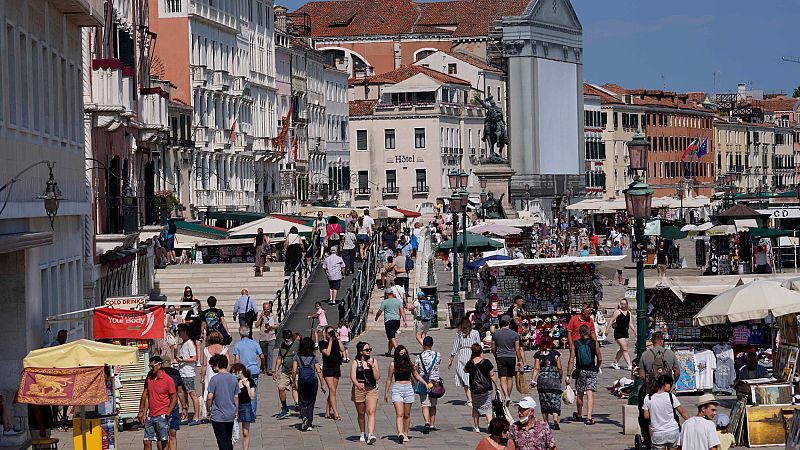Target 2050: European cities want 'balanced' tourism that works for their citizens

By 2050, European cities want a tourism that balances the sustainability, economic, and social dimensions. That was the message on the second day of the Global Tourism Forum, a key annual meeting of tourism stakeholders from around the world.
“In some cities like Venice and Barcelona, we see a sort of monoculturalisation of economic activities in the city centre that tend to maybe serve more marketing interests for tourists or cater for food habits of tourists rather than residents,” said Eleonora Orso, policy officer at Eurocities, the Brussels-based network representing more than 200 major European cities.
Europe welcomed nearly 340 million international tourists in the first half of 2025 — up 4% from last year and 7% higher than in 2019, according to the latest UN Tourism data.
The world’s top destinations remain in Europe, with France and Spain seeing strong growth in arrivals over the same period. Estimates suggest Spain could even surpass France by 2034, reaching 3.75 million visitors.
Patrick Bontinck, CEO of visit.brussels, stressed the need for cities to adopt long-term strategies for tourism — focusing on attracting the right visitors rather than simply more of them. “Choose which you want to attract and decide your infrastructure for those people,” he told the forum.
'Product in tourism is destination itself'
Mass tourism is no longer just a seasonal issue. From Venice to Barcelona, European cities are struggling to manage record visitor numbers. As tourist crowds swell, local residents are being priced out by soaring living costs — prompting widespread protests.
Local authorities from Lisbon to Athens have also warned that the tourism boom is straining infrastructure, increasing pollution, and diminishing residents’ quality of life.
“The product in tourism is the destination itself,” said Sabine Wendt, CEO of visitBerlin, the city’s official tourism organisation. “If we destroy the city socially or environmentally, no one will come anymore.”
Wendt emphasised that all stakeholders — including tourists — share responsibility for protecting the destinations they promote and visit. Eurocities’ Orso added that in order to balance sustainability and profitability, tourism policies must be integrated with broader urban strategies.
“It needs to be part of an integrated urban agenda, related to transport, housing, business support strategies and so on,” she said.
According to the UN Tourism Confidence Index published in September, high transport and accommodation costs remain the main challenges affecting international tourism this year.
Tourism inflation is expected to fall from 8% in 2024 to 6.8% in 2025 — still significantly above the overall inflation rate of 4.3%.
Economic uncertainty and geopolitical tensions are also weighing on travel confidence, experts warn, and a collective effort will be needed to transition from mass tourism to a more targeted, sustainable model.
“Every city has a different way of thinking, so you cannot establish a standard approach, (but) it's absolutely important that the private and public sector work together,” said José Ramón Bauzá, founder of the Aviation and Tourism Forum and former president of the Balearic Islands.
“If not, we will lose not only time but money for investors,” he added.
While the EU has no formal competence over tourism, the European Commission is currently preparing a common strategy for sustainable tourism.
The plan, expected in early 2026, aims to make the sector more competitive, resilient, and sustainable by tackling overcrowding, promoting eco-friendly options, improving digital services, and supporting cross-border travel.
Today

